Get some inspiration before our CNF contest closes. Room collective members share some of our favourite creative non-fiction—from books on writing craft, California, new works on feminism, and coffee, here’s some of what we’re reading and suggest you pick up…
In order to inspire you in the final stretch before our CNF contest closes, Room collective members share some of their favourite creative non-fiction—from books on writing craft, California, new works on feminism, and coffee…
Breathing the Page: Reading the Act of Writing by Betsy Warland, Cormorant Books, 2010
 Betsy Warland’s, Breathing the Page: Reading the Act of Writing, is a series of short essays/teachings that, at times, feels more like a meditation or contemplation on writing. Each section begins with questions such as “What is making my reader feel distant from my narrative? or “Does each narrative, whether it is prose or poetry, have its own distinct use of line?”. Some are commonly asked questions but her responses are far from common. We are taken on a journey as she offers intriguing statements like…
Betsy Warland’s, Breathing the Page: Reading the Act of Writing, is a series of short essays/teachings that, at times, feels more like a meditation or contemplation on writing. Each section begins with questions such as “What is making my reader feel distant from my narrative? or “Does each narrative, whether it is prose or poetry, have its own distinct use of line?”. Some are commonly asked questions but her responses are far from common. We are taken on a journey as she offers intriguing statements like…
“There is a deep familiarity between pencil and hand.”
“The page holds all possibility.”
“Time expands. Contracts. So does the narrative line.”
“All lines require years of effort.”
When speaking of how to sustain ourselves as writers she says, that we must “learn to navigate” or “sidestep lack” as there is often a lack of time or money or many other things that could discourage us. Even so, “Between the page and the writer is magnetism more compelling than any other relationship.” She reminds us that “we can only write incrementally—one word at a time” and that “when we are on the scent of the narrative it is a visceral, elating and sometimes terrifying experience.”—
Even her prose is poetic, her words gentle yet self-assured. You can feel her love of the craft. Time and again she invites you to “breathe the page” as you examine things such as proximity, memory as metaphor, and scored space. In this book she shares over thirty years of writing and teaching experience with us. It is a book that you will return to over and over again. Each time you do you will see something new as it is like most good teachings an unfurling of riches.
Writing as a Sacred Path by Jill Jepson, Celestial Arts, 2008
Jill Jepson’s book, Writing as a Sacred Path, reminds us that “Storytellers are the custodians of human history, the recorders of human experience, the voice of the human soul.” She speaks to how so many of us “risk everything in order to write”, stating that “writing chooses you”. Drawing comparisons between the paths of writers, mystics, monks, shaman and warriors she invites us to think of our writing as a “sacred responsibility” and a “vocation or calling”.
She asserts that the mystics “crazy wisdom” can inform our writing, making richer. That the silence and solitude that those living a monastic existence embrace, is something that all writers also need but like most monks they must also find a way to incorporate community.
All writers spend time diving for words or courting what some call the Muse. Jepson speaks to the ways that this can be supported by ritual and some of the other tools found in Shamanic traditions. Lastly, she points out that the warrior’s path requires courage and skill as does a writer’s life.
Jepson offers tools and exercises to bring some of the teachings from each of these traditions into your writing life. The book is filled with quotes from writers, many of whom may never say that their writing experiences are “mystical” yet they express awe at the wonder of some unnameable creative force or what the Novelist Tim O’Brien calls the “magic dust” of language. She reminds us over and over that “we are the story catchers”.
 Slouching toward Bethlehem, and The White Album by Joan Didion, Farrar, Straus and Giroux, 1968
Slouching toward Bethlehem, and The White Album by Joan Didion, Farrar, Straus and Giroux, 1968
No one thought much of Joan Didion when she immersed herself into the recording studio with The Doors, or in San Francisco’s Haight-Ashbury at its peak, but on the page she is large and loud. A bi-coastal writer, Didion started out at Vogue after she won an essay contest in her final year at Berkeley. Legend has it that the tiny woman climbed up on to the lunch table and started stamping her feet while yelling, “I’m going to New York City!” A moment captured in her famed essay, “Goodbye to All That” in her first non-fiction work, Slouching Towards Bethlehem. Now over 60 years later, she begins each day by retyping the work she completed the day before as a way to remember its rhythms. Each of these carefully crafted sentences stack one on top of each other until it creates the richest prose; she is a truly a master of the genre. All the essays you’ve ever skimmed over, and the memoirs you’ve ever slogged through, and all the books on craft you have ever painstakingly noted will inform you that you’ll never look at CNF the same again. In fact, you never will.
 Bad Feminist: Essays by Roxane Gay, Harper Perennial, 2014
Bad Feminist: Essays by Roxane Gay, Harper Perennial, 2014
For many fans and critics, Roxane Gay is the voice of a generation—more specifically—this generation of intersectional feminists who also happen to be complex human beings (as are everyone else).
Her essays on racism, misogyny, sexuality, pop culture, literature, feminism, and the areas where these issues overlap, have been published widely, a few of which has been collected in her first collection of essays, Bad Feminist. Despite her extensive academic background, her writing is accessible and that’s one of its biggest assets. Gay writes about subject matters that are hard to read but in a way that are easy to understand. The discourse around topics such as representation, privilege, and discrimination should not be understood only by a few, it should not marginalize the marginalized. This is not to say that she dumbs down complex issues into Tumblr memes; the accessibility of Gay’s essays is calculated and significant. In Bad Feminist, she dissects and articulates intricate and often loaded issues such as racial profiling, rape culture, trigger warnings, the idolization of Chris Brown, the importance of diversity in representation and within feminism itself, with precision and no fanfare.
The concept of “speaking for others” might be a feminism faux pas (and rightfully so), but I let Gay speak for me any chance I get. Is that racist? What is everyone so sensitive these days?
“It’s hard not to feel humourless, as a woman and a feminist, to recognize misogyny in so many forms, some great and some small, and know you’re not imagining things. It’s hard to be told to lighten up because if you lighten up any more, you’re going to float the fuck away. The problem is not that one of these things is happening; it’s that they are all happening, concurrently and constantly.”
—Roxane Gay on mainstream media in “Blurred Lines, Indeed” from Bad Feminist.
 At Large and At Small: Familiar Essays by Anne Fadiman, Farrar, Straus and Giroux, 2007
At Large and At Small: Familiar Essays by Anne Fadiman, Farrar, Straus and Giroux, 2007
In her own words, the essayist is an “enthusiastic amateur, not scholar”. Equal parts personal and factual, inward and onward, Fadiman’s collection of familiar essays feels like a friend speaking ardently about a favourite subject, with an evident amount of dedication and experience on the matter. Essays in At Large and At Small feature subject matters ranging from lepidopterology, Charles Lamb, Samuel Coleridge, coffee, ice cream, moving, to being a night owl. The writer’s tunnel-vision approach and feverish nature that come with her interests are contagious. While the success of an essay can often be approximated by a writer’s ability to interest their readers in something that they did not care about before, Fadiman’s essays easily surpass that—her enthusiasm also has the capacity to trigger an overall sense of curiosity in her readers. While many of us are mastering multitasking and busy being busy, there’s an underrated value in “wasting” time doing and obsessing over things that might not add any value to our professional or financial life. Fadiman’s essays really make a case for delighting in subjects and activities purely for the joy of them, even though they might not result in any quantifiable consequences, except perhaps our sanity.

 Slouching toward Bethlehem, and The White Album by Joan Didion, Farrar, Straus and Giroux, 1968
Slouching toward Bethlehem, and The White Album by Joan Didion, Farrar, Straus and Giroux, 1968 Bad Feminist: Essays by Roxane Gay, Harper Perennial, 2014
Bad Feminist: Essays by Roxane Gay, Harper Perennial, 2014 At Large and At Small: Familiar Essays by Anne Fadiman, Farrar, Straus and Giroux, 2007
At Large and At Small: Familiar Essays by Anne Fadiman, Farrar, Straus and Giroux, 2007












